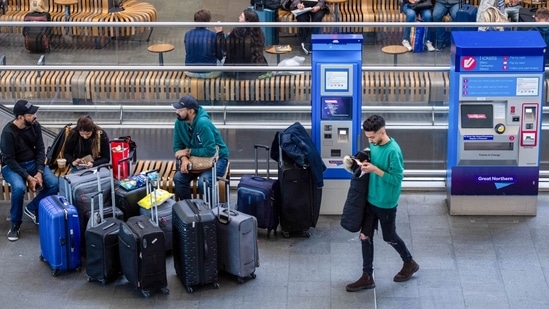Queen Elizabeth’s demise stopped rail strikes in UK. Now, they’re back
Train passengers in the United Kingdom were left in a lurch as more than 40,000 rail workers resumed their strikes following the mourning period of Queen Elizabeth II. According to several media reports, only 20 per cent of the rail services were running on Saturday.
The rail passengers were informed that around half of the network will be closed during the day and trains will only run from 7:30 am and 6:30 pm, Independent reported. People were advised to travel by train only if it is absolutely necessary.
On Wednesday, the railway workers including those from the drivers union Aslef and the Transport Salaried Staffs Association (TSSA) had staged a walkout, and had also going on strike last Saturday, resulting in only 11 per cent trains running across UK, AFP reported.
On Friday, the RMT union announced that the British rail workers at ScotRail will go on strike on Monday i.e October 10. The company owned by Scottish government has more than 5,000 employees, Reuters reported.
Who are participating in rail strike?
The National Union of Rail, Maritime and Transport Workers (RMT), the Transport Salaried Staffs’ Association and the Associated Society of Locomotive Engineers (ASLEF) have been leading the rail workers strike.
On October 1, the first strike of the month took place a day before the Conservative Party conference in Birmingham and the London marathon. The members of RMT union and ASLEF had walked out.
After the walkout on Wednesday, the white-collar staff belonging to the TSSA and Unite unions went on strike at East Midlands Railway and the Great Western Railway, Independent report stated.
Why are rail workers on strike?
The British railway workers have been demanding pay hikes as the country is facing inflation due to Covid-19 pandemic and the Russia-Ukraine war.
According to a BBC report, railway worker unions have been blaming the government for the cuts and below-inflation wage proposals. The government said the railways need reform and massive pay hikes could send inflation out of control.

British government’s stand
The ongoing railway workers strike is the biggest challenge faced by new prime minister Liz Truss, who succeeded Boris Johnson. On September 22, she had appealed to the railway employees to get back to work ahead of the strike. Truss had said she aimed to take a constructive approach to the dispute but the workers should avoid further disruption and abandon strikes planned for early October, Bloomberg reported.
As the strikes went on despite the appeal, the government on Wednesday hit out at the striking unions, calling them ‘militant union’ and characterised them as part of an “anti-growth coalition” holding the country back.
For all the latest Business News Click Here
For the latest news and updates, follow us on Google News.

